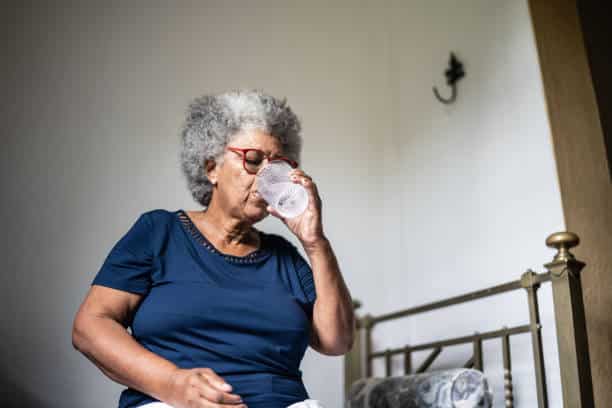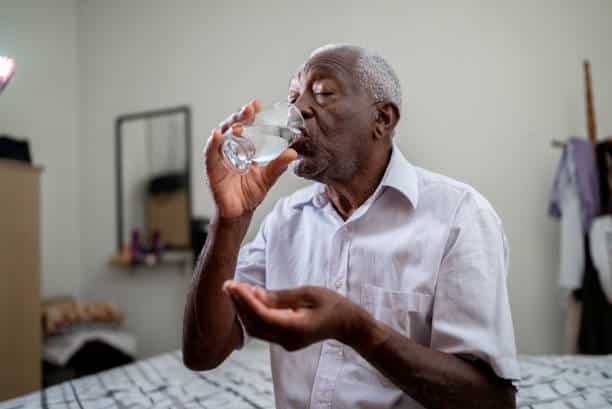
If you’re trying to get a good night’s sleep, the last thing you want is to be woken up by thirst. To make matters worse, drinking copious amounts of water during the night increases the chances that your full bladder will be the next reason you’re awake. It’s an annoying cycle that will only leave you exhausted in the morning. Thankfully, once you know what’s causing your thirst and how to deal with it, you should be back to sleeping well.
5 Reasons You’re Craving Water at Night
1. Your Daytime Hydration is Lacking
Staying hydrated is imperative to ensuring that your body has the right amount of water to carry out its necessary functions. Apart from simply needing water, proper hydration maintains a delicate balance between the fluids and electrolytes in your body. That’s why even mild dehydration can lead to headaches, dry skin, low blood pressure, and muscle cramps.
When you’re dehydrated, your body produces the antidiuretic hormone, vasopressin, that tells your body you need to hydrate. This hormone sets off a series of processes. Not only will you feel thirsty, but your kidneys will start to store water instead of producing urine. If you don’t satisfy your thirst during the day, your body will keep craving water even as you try to sleep.
Interestingly, being dehydrated during the day isn’t only caused by not meeting your water requirements. Sweating excessively, being ill, vomiting, or having diarrhea can encourage water loss. Some medications, like antidepressants, can also cause dehydration.

2. You’re Losing Water at Night
Sometimes, poor hydration habits aren’t the problem. Though your body can lose fluids and electrolytes naturally when you sleep, snoring or breathing through your mouth can lead to moisture loss at night. This occurrence is even more likely if you have sleep apnea and need to use a CPAP machine to help you sleep well. The machine, as well as the medications you may need to take, can dry out your mucous membranes, resulting in dehydration.
Things can be just as bad if your sleep disorder is not being treated, as research shows that there may be a link between sleep disorders and dehydration. The results of a small study suggested that when you don’t sleep well, it inhibits the production of vasopressin. When this happens, your body might not be able to regulate your water retention properly, so you’re thirsty more often.
Additionally, if your room is too hot, you’re more likely to sweat and lose water that way. For people going through menopause, night sweats are the likely culprit of water loss while trying to sleep.
RELATED: Stay Thirsty My Friends: The Importance of Keeping Hydrated
3. Your Room’s Air is Too Dry
If you live somewhere with drier air, your nasal passages and mouth can suffer from moisture loss easily. This can happen during the winter and in desert or mountain climates. This loss of moisture makes you thirstier more quickly while you’re sleeping.
You can have the same experience if the air is humid. When this happens, the air is already filled with moisture, so your sweat doesn’t evaporate as easily. Though you’re still sweating, you don’t experience its usual cooling effect. The result is you’re left sweaty, hot, and dehydrated.
4. You Have a Chronic Illness
Sometimes the cause of your thirst is not as straightforward. Certain chronic illnesses can cause complex situations in your body that lead to increased feelings of thirst. For example, constant thirst is a characteristic symptom of diabetes. Because people with this condition have trouble processing sugar correctly, their kidneys have to work harder to maintain their blood sugar levels. They usually do this through frequent urination, resulting in thirst.
With diabetes insipidus, in particular, the kidneys don’t reabsorb water efficiently, so you would have excessive urination and constant thirst. However, diabetes isn’t the only condition that can cause this issue. People with kidney disease, cancer, and urinary tract infections may also experience dehydration and frequent thirst.
5. You Had Alcohol at the Wrong Time
For most people, having a drink before bed can help them relax and fall asleep. Unfortunately, that could be the wrong time for alcohol. Alcohol is a diuretic that makes you want to urinate more frequently. As you might expect, going to the bathroom more often makes you thirsty. That’s two ways drinking alcohol before going to sleep will ensure you don’t stay asleep for long.

RELATED: Are You Drinking Enough Water?
How to Manage the Causes
It’s fairly easy to ensure that you remain hydrated during the day. Under normal conditions, doctors recommend that women drink about 11 ½ cups of water per day, while men should aim for 15 ½. Of course, this number can vary depending on your circumstances. If you have kidney disease, for example, you will have a different target based on how well your kidneys are functioning.
When you’re hydrating, though, doctors encourage you to think beyond water. If you’ve been working in the sun or sweating excessively, you’ve lost electrolytes as well as water. That means you should consider drinking electrolyte-rich beverages that will replace both.
If the problem is the state of the air in your room or the temperature, consider implementing ways to change that. A humidifier is a good way to combat dry air, and adding plants like the spider plant or Boston fern can help as well. On the other hand, proper ventilation is the answer to humid air. You should open the windows and use extractor fans in rooms that are prone to collecting moisture. Dehumidifiers and air conditioning will also help.
For those who have a chronic condition, the best way to manage thirst is to ensure that your condition is under control. Generally, that means sticking to your medical regimen and talking to your doctor if you suspect your medications are no longer effective. If you’re dealing with sleep issues and the side effects of treatment, talk to your doctor about your options. Sometimes modifying your CPAP mask and using a humidifier can help.
Finally, doctors typically advise against having a drink before bed. If you want to have some alcohol, the best time is a few hours before it’s time to go to sleep. Herbal teas like chamomile can be a safer option for relaxation.
When to Talk to Your Doctor
While some good tips for dealing with thirst at night are listed above, the list is far from exhaustive. It’s a good idea to let your doctor know if you’re waking up to drink water at night. Frequent and unexplained thirst should never be ignored, whether or not you have a chronic illness.
Getting up to drink water at night isn’t only annoying, but it can lead to health issues because you’re not sleeping well. You should start by changing any areas affecting hydration or how well your body maintains moisture, but don’t forget to talk to your doctor as well.








